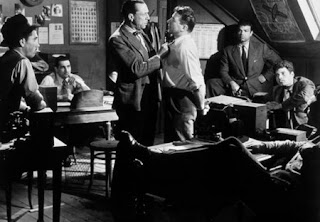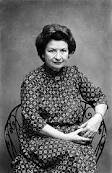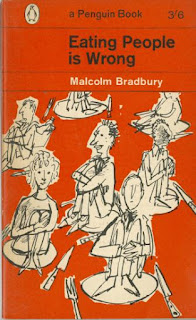John Le Carre Chronological Challenge 5
I seem to have got a bit behind with my John Le Carre Chronological Challenge, this year, after reading his first 4 novels in quick succession at the start of the year. So finally we're on to novel 5 - A small town in Germany.
The small town of the title is Bonn, the capital of the Federal Republic of Germany. A small town that is struggling to come to terms with its new title as the centre of West German federal life. It is the late 1960's. Students are rioting across Europe, the Cold War seems to be at its coldest, politics is becoming polarised, and Britain is in desperate talks to try and join the Common Market. In the midst of the political intrigue, it almost goes unnoticed that a minor functionary in the British Embassy in Bonn has gone missing. There is evidently something suspicious though about his disappearance as Alan Turner, spy catcher extraordinaire, is sent out from London to track down Leo Harting, who, it appears has turned rogue and is on his way to Moscow with British secrets.
Turner soon realises however that Harting is not going to be ferrying British secrets to Moscow, but with his old-style politics now well out of fashion, the diplomats are playing a dangerous game as they try to keep the Germans onside, while discarding the past.
When I reviewed The Looking Glass War in February, I remarked how modern it felt despite being rooted in the Cold War of the '60's. With a fictional imminent entry into war based on the flimsiest of evidence, it felt like an early draft for the Iraq War. I had much the same feelings about A small town in Germany. It felt particularly odd to be reading it as Brexit negotiations stumbled on in the background (I finished the novel just before news broke about agreements on an open Irish border, and European citizens). In Small town in Germany what lies at the heart of the novel is Britain's increasingly desperate attempts to join the Common Market, despite the "Non" of General de Gaulle (which may actually have been a misunderstanding, see Crispin Tickell's recollections).
The novel shows how fast history moved during the twentieth century as Europe attempted to move away from a war torn century to a more settled and peaceful state. Inevitably though, in what was almost an extended series of peace negotiations the past had to be left behind; but also inevitably this led to some difficult moral conundrums. Can what is in essence unforgivable be forgotten if it is for the greater good? Is it ever right to let the sufferings of those who are unable to speak for themselves go unpunished in order to build a society where that can never happen again? Or is to forget history in order to make a better world, a precursor to it repeating itself?
In many ways, Le Carre's Small town in Germany has much in common with Frederick Forsyth's The Odessa file. Both deal with new societies and loyalties, while struggling to deal correctly with a horrific past. Forsyth's struggling journalist has more in common with how I think we would like to believe the world to be, but I am sure that Le Carre's "shades of grey" how political expediency really is. This feels wrong, but ultimate!y how else can the world survive with a compromised past without forgetfulness?
In a world that seems to be changing swiftly, and becoming odder by the day. Le Carre shows that it's nothing new. We're not the first generation to be dealing with compromise and a rapidly changing worldview, and we almost certainly won't be the last. Perhaps instability and compromise is really the norm, the Chinese curse of "interesting times" is just what happens. How you deal with it as an individual though is something quite different...
 |
| Bonn, a "small town in Germany" |
Turner soon realises however that Harting is not going to be ferrying British secrets to Moscow, but with his old-style politics now well out of fashion, the diplomats are playing a dangerous game as they try to keep the Germans onside, while discarding the past.
When I reviewed The Looking Glass War in February, I remarked how modern it felt despite being rooted in the Cold War of the '60's. With a fictional imminent entry into war based on the flimsiest of evidence, it felt like an early draft for the Iraq War. I had much the same feelings about A small town in Germany. It felt particularly odd to be reading it as Brexit negotiations stumbled on in the background (I finished the novel just before news broke about agreements on an open Irish border, and European citizens). In Small town in Germany what lies at the heart of the novel is Britain's increasingly desperate attempts to join the Common Market, despite the "Non" of General de Gaulle (which may actually have been a misunderstanding, see Crispin Tickell's recollections).
The novel shows how fast history moved during the twentieth century as Europe attempted to move away from a war torn century to a more settled and peaceful state. Inevitably though, in what was almost an extended series of peace negotiations the past had to be left behind; but also inevitably this led to some difficult moral conundrums. Can what is in essence unforgivable be forgotten if it is for the greater good? Is it ever right to let the sufferings of those who are unable to speak for themselves go unpunished in order to build a society where that can never happen again? Or is to forget history in order to make a better world, a precursor to it repeating itself?
In many ways, Le Carre's Small town in Germany has much in common with Frederick Forsyth's The Odessa file. Both deal with new societies and loyalties, while struggling to deal correctly with a horrific past. Forsyth's struggling journalist has more in common with how I think we would like to believe the world to be, but I am sure that Le Carre's "shades of grey" how political expediency really is. This feels wrong, but ultimate!y how else can the world survive with a compromised past without forgetfulness?
In a world that seems to be changing swiftly, and becoming odder by the day. Le Carre shows that it's nothing new. We're not the first generation to be dealing with compromise and a rapidly changing worldview, and we almost certainly won't be the last. Perhaps instability and compromise is really the norm, the Chinese curse of "interesting times" is just what happens. How you deal with it as an individual though is something quite different...









Comments